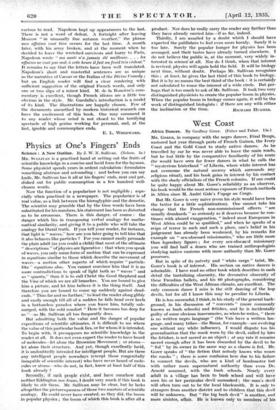Physics at One's Fingers' Ends
Science : A New Outline. By J. W. N. Sullivan. (Nelson. 5s.) MR. SULLIVAN is a practised hand at setting out the fruits of scientific knowledge in a concise and lucid form for the layman. Some physicist spends years in ardent calculation : formulates something abstruse and astounding : and before you can say knife, Mr. Sullivan has it all at his fingers' ends, neat and pat, dished out for public consumption in a few hundred well- chosen words.
Now the function of a popularizer is not negligible ; espe- cially when practised in a newspaper. The popularizer is of real value, as a link between the hieroglyphic and the demotic. The scientist may grumble that by the time words have been substituted for his numbers, his statement has been so distorted as to be erroneous. There is this danger, of course : the danger which lies in transposing verbal analogy • for mathe- matical similarity, and giving it to a public who will take the analogy for literal truth. If you tell your reader, for instance, that light is " waves," how are you later going to tell him that it also behaves like particles ? For you cannot easily persuade the plain adult (as you could a child) that most of the ultimate• " descriptions " of 'physics are figurative : that when you speak of waves, you only mean form of motion that can be expressed in equations similar to those which describe the movement of waves—a motion other aspects of which require " particle- like " equations also. You cannot convince-him that it is no more contradictious to speak of light both as " waves " and as " quanta," than it is to call Christ the. Good. Shepherd and the Vine of which we are all branches. You are bound to give him a picture, and let him believe it is the thing itself. And therefore you are bound to come up suddenly against dead- ends, " Thus far and no further," to lead the reader along glibly and easily enough till all of a sudden he falls head over heels in a bottomless paradox where you leave him, totally sub- merged, with the cold comfort " Here it becomes too deep for us "—as Mr. Sullivan all too frequently does.
But admitting both the value and the danger of popular expositions of scientific ultimates, it is difficult to see where the value of this particular book lies, or for whom it is intended.
To begin with, it presupposes no scientific knowledge in the reader at all. It does not even expect the reader to have heard of molecules—let alone the Brownian Movement ; or atoms— let alone their structure. And yet, though excellently lucid, it is undoubtedly intended for intelligent people. But are there any intelligent people nowadays (except those congenitally incapable of scientific interest) who have never heard of mole- cules or atoms—who do not, in fact, know at least half of this book already ?
Secondly, if such people exist, and have somehow read neither Eddington nor Jeans, I doubt very much if this book is likely to stir them. Mr. Sullivan may be clear, but he lacks altogether the picturesqueness of those two masters of scientific analogy. He could never have created, as they did, the boom in popular physics ; the boom of which this book is after all a
product. Nor does he really carry the reader any further than they have already carried him—if as far, indeed.
Thirdly, I am assailed by a doubt which I should have expected the publishers to feel even more keenly. Surely it is too late. Surely the popular hunger for physics has been assuaged, and their tastes have already turned elsewhere. I do not believe the public is, at the moment, very widely in- terested in science' at all. Nor do I think, when that interest is revived, physics will again hold the field. It will be biology next time, without doubt. Perhaps Mr. Sullivan recognizes this ; at least, he gives the last third of this book to biology. But it is by no means the best third of the book : it is certainly not calculated to rouse the interest of a wide circle. But per- haps that is too much to ask of Mr. Sullivan. It took two very distinguished physicists to create the popular boom in physics. When the popular boom in biology comes again, it will be-the work of distinguished biologists : if there are any with either


















































 Previous page
Previous page